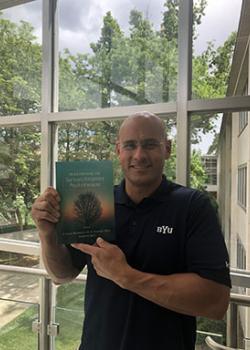
“However you believe in a higher power, however you feel a connection to heaven, or whatever heaven looks like to you, that very belief and value has a benefit in your psychological well-being.”
This is the theme of the new textbook, “Handbook of Spiritually Integrated Psychotherapies”, edited by BYU professors P. Scott Richards, G. E. Kawika Allen, and Daniel K. Judd. The creation of this textbook was made possible by the John Templeton Grant, a $4 million grant awarded to the textbook editors from a field of hundreds of applicants.
The funding supported research at 21 sites around the world, united by a goal of finding noninvasive ways to incorporate individual’s spirituality to help patients through their healing process. This aspect of mental health, Allen believes, has been overlooked for too long.
“We believe that spiritual methods can really heal individuals in certain ways that current, modern, secular ways can’t in psychology or in psychotherapy,” he says.
While the textbook’s editors share similar belief systems, the research covered multiple faith perspectives and practices across the world.
“We had Jewish individuals from Jerusalem,” Allen says “We had Catholic scholars and researchers and clergy, clergymen, priests and so forth. We had Baptists, we had Evangelicals, a variety of different faiths, all of them across the board.”
The research, Allen says, found that spirituality is helpful regardless of a person’s beliefs. Practices like dependence on a belief system, prayer, meditation, fasting, scripture study, and attending worship services had positive effects on patients.

While many university programs that train therapists include only a short mention of spirituality, Allen hopes the new textbook begins to change that, starting a process that ends with inclusion of spiritual practices an integral part of programs across the United States.
“We want to take it a step further and make it a part of the curriculum, a standard class,” he says.
In the shorter term, Allen and his team hope the textbook helps mental health counselors to consider the role played by spirituality and religiosity in their patients’ health and integrate it into their treatment plans. For current practitioners, the textbook fills a gap in the curriculum that will benefit patients and those treating them. For any religious person, incorporating this important aspect of their life in their treatment plan can boost both progress and wellbeing.
“This is an important piece to the puzzle of mental health,” says Allen.
Writer: Bridget Quain
Contact: Andrew Devey